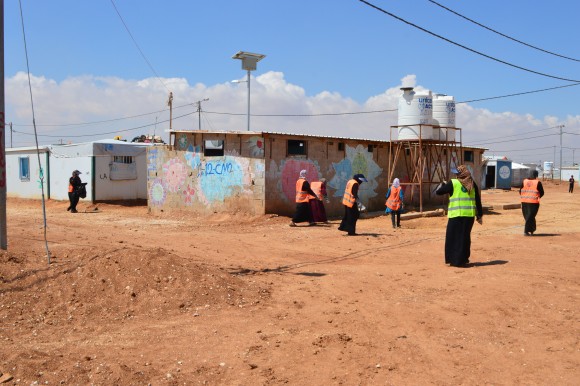Women refugees who are single mothers or heads of households have difficulties supporting themselves and their families in Za’atari refugee camp. In partnership with UNICEF, French NGO ACTED developed employment opportunities for women to provide a valuable boost to their income. The program, however, has been challenged by community who view the work as shameful to the women.
Dressed in fluorescent orange vests, a group of Syrian women refugees walks through one of the many neighbourhoods, known as blocks, of Jordan’s largest and most established refugee camp, Za’atari. Armed with gloves and bin bags, the small group of women fans out across the streets and gather plastic bags and other litter strewn around the block. The women are part of ACTED’s cash-for-work program and provide crucial waste-collection services to the estimated 79,500 refugees calling the camp home.
In exchange for maintaining camp cleanliness, the women earn an additional 20 Jordanian Dinar (JOD) , or 28 USD, per week to supplement their monthly 20 JOD allowance provided by the World Food Programme. The camp, established in 2012, is now approaching its fifth anniversary, and many of the camp’s residents have seen their savings shrink due to low employment opportunities and Jordan’s high living costs.
I am very happy with this work opportunity.
A single woman and the head of her family, Islam has worked in ACTED’s Cash for Work program since the inception of the pilot project in late 2015. She now leads a team of eight women, all of whom are single mothers or heads of households, to ensure that the block in which they live is clean. “For me, the extra income is very important, my mother is sick and the extra money I receive doing this work allows me to support her,” she explains.

The largest employer of women in Za’atari refugee camp
For Abdelhamid Naimi, ACTED’s project manager for solid waste management in Za’atari, the project has been a huge success.
Originally, I was very pessimistic about this project because normally we do not see women doing this kind of work in Jordan or Syria.
But after community discussions and mobilisation explaining the employment opportunities, the project quickly expanded and is now the largest employer of women in the camp.
The project has, however, not been met without resistance.
It was very strange for the community to see women doing this work in the beginning and we faced some troubles. People would say that the work we do in the streets is shameful.
In order to change the community’s negative perception of women working in the streets, ACTED organised numerous community meetings and discussions, highlighting that vulnerable women needed additional income in order to support themselves.
Islam and her team claim that harassment has steadily decreased over the year but that occasionally they still receive degrading comments from passers-by. Asimi understands that the situation is not perfect but maintains that conditions have improved over time and that ACTED will continue to work towards changing community perspectives. A recent assessment study revealed that nearly 90% of women were satisfied with their work. As one of the cleaners in Islams team put it, “This job is very hard for us but it is better than begging.”
With 90 women now employed under ACTED’s program, Naimi aims to reach gender parity this year.
Currently 30% of our workforce are women, I hope that soon we will reach 50%.
In the coming months ACTED’s water, hygiene and sanitation teams will continue to encourage women to join the cleaning crews. Focus group discussions with the community members will highlight the opportunities and benefits of engaging in such work.
